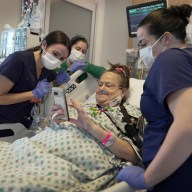When we speak Diane Lane is recovering from a two-show day on her new Broadway play, “The Mystery of Love and Sex.” Actors who tend to mostly do film always remark about the effect returning to the stage has on the body. “It’s so true. It’s like having a baby. You forget,” Lane remarks. But she remebers very well a film she shot a fair amount of time ago: “Every Secret Thing,” in which she plays a mother whose two daughters (Danielle Macdonald and Dakota Fanning) who, when they were little girls, kidnapped a baby, leading to a tragic outcome. Now teenagers, they’re suspected when another baby in their neighborhood goes missing. Like Macdonald and Fanning, you were a child star, making your debut in 1979’s “A Little Romance,” with Laurence Olivier. How do you tend to deal with younger actors?
It was nice to be on the other side of the equation. I remember being a very young person working on film sets. I never really recovered from the kindness I was shown by adults when I was a young person, and am happy to reciprocate that now. It’s been different from my experiences, though, what these kids had to go through, because it’s so grim. Your character is an interestingly tragic character, who’s both manipulative and traumatized by events in the past.
Her story is more understood in the book, as with any character from a book, since you have more time to flesh things out. She found a way to be giving of herself by teaching art in school. But it’s displaced attention, because it’s a form of giving that is safe for her and doesn’t challenge her inability to be intimate with others. She’s not investing in her daughter; she’s giving it anywhere she can. She definitely has trouble connecting with both of her daughters.
As a young woman, or whatever age a person becomes a mother, you’re faced with this expectation that you’re going to be able to nurture somebody who has a very different proclivity than you can identify with. There’s a book that was given to me called “Far from the Tree.” It’s a visitation of various kinds of children that are born to “normal” parents, and the challenge is for the parents to find a way to nurture somebody that is very alien to them. That’s what happens in our movie, that her daughter is so completely different from her that she just doesn’t identify with being her mother. That’s definitely part of her failure. This film also deals with what we as a society do with people who’ve done something heinous. F. Scott Fitzgerald’s line “there are no second acts in American lives” still for the most part holds up today. Their identity is completely changed for us. If you’re capable of [doing something bad], then who are you? Are you a monster now? There’s so much people are capable of that they would never want to admit. And that’s part of what this movie delves into. Why would a young person steal a baby? It’s a manifestation of an unanswered cry for attention, projected onto this baby. In the psychology of a child’s mind it might not be as horrible as an adult would perceive it. And the neglect continues while they’re incarcerated. The word “rehabilitation” to me is almost an insult to what actually winds up occurring most of the time. This is also a film whose cast is largely women and which was produced, written and directed by women, respectively Frances McDormand, Nicole Holofcener and Amy Berg.Was that a major attraction for you to get involved? No, I just thought the topic and the book were enough. The fact that women were bringing it to life made sense, in a way. I wouldn’t have noticed it if it weren’t such an anomaly, sadly. [Laughs] As far as statistics go, it’s noteworthy. But I don’t think it’s any less interesting to non-females. It’s not a pandering journey into the female experience. It’s just human experience. In addition to increasingly awareness recently over gender inequality in Hollywood, there’s also been some gender-blind casting in blockbusters.
I think we’re going to see more and more of that in the future. Women are the greatest untapped resource in every field of endeavor. It’s great to see the diverse experiences of women on screen. What I loved about “Gravity” was that it didn’t matter what the gender of the person was. You shared the journey of the character. It wasn’t a woman’s story, and it wasn’t a macho story. I think what interests women and what interests men is blending, and that’s a good thing. We’re all of us complete beings, no matter what’s between our legs. The genderization of drama is kind of shallow. [Laughs] The only way to grow is up, and up is out of that mindset of corralling experiences into genderized distinctions. Even the deity of our creator has been genderized. It also happens to have been made into a male. Imagine if it were genderized and it were made into a female. It’s just as likely; it’s 50/50. [Laughs] We don’t realize we’ve been seeing life in a frame that is masculine. Presuming the gender is putting God in a box. I have to tell you, I have out from Netflix — as one of the last remaining people who gets DVDs out from Netflix — the 1982 punk film you made, “Ladies and Gentlemen, the Fabulous Stains.” [Laughs] Enjoy that! It was February of 1980. I had just turned 15 and my good friend [and costar] Laura Dern just turned 13. We’ve been friends ever since. We had such a great time on that. It was the real deal. They made movies that were trying to harken back to that era, but we were really living it and showing it. And it has a young Ray Winstone.
Oh yeah, he was hot!
Diane Lane on young actors, parenting and de-genderizing Hollywood
Follow Matt Prigge on Twitter @mattprigge


















